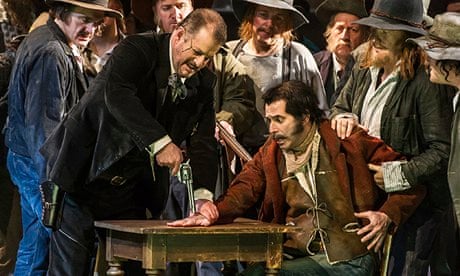It's more than 20 years since a major British opera company last presented a new production of what has been called the first spaghetti western. La Fanciulla del West (The Girl of the Golden West) is one of Puccini's greatest scores, and it's hard to explain why it is not seen more regularly. The setting, a mining community during the Californian goldrush of the 1850s, is no more exotic or unlikely than the orientalisms of Madama Butterfly and Turandot, while its central characters are as crisply defined as those in La Bohème or Tosca. In fact, one of the fascinations of the new Opera North production, directed by Aletta Collins, is the dramatic and psychological parallels it draws, intentionally or not, with Tosca; though in Fanciulla, the ending is a happy one.
It could be that companies steer clear of the piece because it seems to need an expensive, naturalistic staging; Covent Garden's famously lavish production by Piero Fagioni might be partly responsible for that. But Collins's show, designed by Giles Cadle, demonstrates that extravagance isn't necessary. Minnie's Polka Saloon may seem a bit spartan – a couple of pine-tree silhouettes have to stand in for the mountains of the Sierra Nevada, while there are some funny hats and unlikely facial hair among the chorus – but the drama is drawn tightly enough to make such things irrelevant.
The high standard of the performances helps a great deal, too. Richard Farnes and the Opera North orchestra relish every morsel of the music, in which Puccini shamelessly assimilates modernist ideas (from Debussy and Ravel especially) and makes them indelibly his own; it all provides sumptuous support to the singers. Alwyn Mellor gets the balance between Minnie's dreams of personal happiness and her duties as foster mother to the miners just right, and copes heroically with the cruel demands of Puccini's vocal writing. Rafael Rojas gives Dick Johnson a nice mix of machismo and self-pitying sentimentality, while Robert Hayward's brooding Rance is a fascinating study in obsession and self-loathing, and succeeds in making the character genuinely touching in the final moments. The smaller roles – especially Bonaventura Bottone's bartender Nick, Graeme Danby's Wells Fargo agent, Ashby, and Eddie Wade's Sonora – are just as sharply defined.
Some of the direction of the chorus could be less caricatured – it's hard to believe the dysfunctional bunch of the first act turns into the lynch mob of the third – but that's a minor quibble. Opportunities to see and, particularly, to hear this music come along too rarely nowadays to worry about that.

Comments (…)
Sign in or create your Guardian account to join the discussion